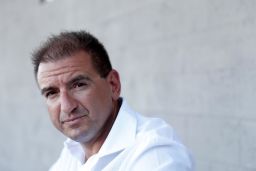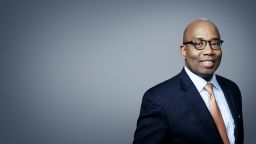YouTube, Facebook and Apple have taken steps to remove content associated with InfoWars and its founder Alex Jones. CNN Opinion asked a group of contributors to weigh in on the implications for both free and commercial speech and what it means in the political moment. The opinions expressed in this commentary are solely those of the authors. View more opinion articles on CNN.
LZ Granderson: I don’t like what Alex Jones says, but I like that I can call him an idiot

One of the most fascinating groups of people to me are those who declare themselves to be unequivocally pro-life and yet support the death penalty. I’ve often wondered what kind of intellectual gymnastics one has to perform in order to house these seemingly dueling beliefs in one mind. I feel the same about racist gay people and Constitutionalists who dislike protestors.
And then there are the liberals celebrating the censorship of Alex Jones, a disgusting conspiracy theorist who, the last time I checked, has the same inalienable rights as those who oppose his brand of hate speech. in
As you can probably tell, I do not like the content Alex Jones produces. I believe he is a racist who has found a way to monetize the fear some white Americans have about the country’s evolving demographic. I am also uncomfortable with his reported influence on the White House.
But that doesn’t mean I view systematically scrubbing him from the internet, as Apple, Facebook, and YouTube have tried to do, as a victory. Why? Because I enjoy hip-hop, Elvis Presley, and “The Catcher in the Rye” – and at some point in our country’s history, all three were in the sights of people who didn’t approve of its content (or in Elvis’ case, hips).
Restricting offensive or harmful language for the greater good is all fine and dandy until you become beholden to a definition of “greater good” you don’t agree with. Or when you oppose a politician’s view of “offensive.”
Today the mob is for you, but tomorrow you could be Larry Flynt, who endured decades of court cases and was shot because people thought the content in Hustler Magazine was not worthy of First Amendment protection. Times are obviously different today – paging Kim Kardashian – but the tendency to cherry pick the Constitution remains. Again, I don’t like what Alex Jones has to say. But I do like the fact I can call him an idiot. That’s America, baby.
LZ Granderson is a journalist and political analyst. He is a co-host of ESPN’s SportsNation and ESPN LA 710’s Mornings with Keyshawn, Jorge and LZ. Follow him on Twitter and Instagram @lzgranderson.
Ruth Ben-Ghiat: I applaud the decision to finally remove content associated with this propaganda machine

The decision of Apple, Facebook and YouTube to finally remove social media content associated with Alex Jones and his InfoWars propaganda machine for violations of their hate speech and harassment guidelines is overdue and worthy of applause.
Jones and his team specialize in trying to discredit or deny anything that gets in the way of their paranoid worldview, where the Sandy Hook massacre was faked, President Barack Obama was not born in America, former presidential candidate Hillary Clinton ran a sex-trafficking operation, and Nazis and other fascists were actually the creators of a left-wing authoritarianism that now threatens America.
These actions by technology and social media giants simply remind us of the short path from an outfit like InfoWars to President Donald Trump’s White House. The idea that leftist “Nazis” victimize the right infuses the “histories” and “commentary” peddled by White house darling (and convicted felon, later pardoned by Trump) Dinesh D’Souza. His book “The Big Lie” distorts the work of many scholars, including me, on Italian fascism to claim that Mussolini and Hitler were actually left-wingers – all to try and cleanse the right of any responsibility for violence. Donald Trump Jr. co-hosted the Washington, DC, premiere of D’Souza’s fact-free film, “Death of a Nation.”
Twitter’s silence so far on this matter is deafening, considering that the platform hosts one of the main sources of lies, threats and racist slurs against individuals and causes that don’t support the right’s alternate reality: Trump’s personal Twitter account, with 53.5 million followers.
Trump’s campaign had a tight relationship with InfoWars, and Trump has legitimated Jones and his false content by showering him with praise, even asserting that Jones deserves a Pulitzer, journalism’s highest award. The two are also kindred spirits, since Trump himself is a one-man lie factory: he now makes 7.6 false or misleading claims per day, for a total of 4,229 since the inauguration, according to the Washington Post.
Jones may be partly silenced, but only a concerted and bipartisan effort will stop a crusade against truth that’s unparalleled in American history and of the utmost gravity, given the support it enjoys from the apex of power. Those companies who don’t step up to the plate now should re-examine their priorities.
Ruth Ben-Ghiat is a frequent contributor to CNN Opinion, and professor of history and Italian studies at New York University. Follow her on Twitter: @ruthbenghiat.
Marc Randazza: Liberals may regret this

Facebook and the other Silicon Valley companies may have a legal right to kick anyone off their platforms they like. But the better policy, from a libertarian perspective, is to champion free expression – which is what Silicon Valley used to do – before it became beholden to outrage mobs.
There was a time when Silicon Valley policy ran on the same philosophical lines as the First Amendment. The internet promised to be the final incarnation of the Enlightenment – the true Marketplace of Ideas. Advocacy of violence or criminal activity might have gotten one banned, but not simply “incorrect opinions.”
In today’s society, a few internet platforms dominate the public sphere – and they are the new public square. And society is better if all opinions and ideas are allowed to flourish – even those that might bother you.
I am old enough to remember when liberals opposed corporate dominance of the marketplace of ideas. I remember us being aghast when corporate conglomerates took over the FM radio dial. I remember us being horrified when we realized media consolidation and some corporate overlords could begin to limit viewpoints or affect decisions about what got covered in the press.
But then Silicon Valley decided to collectively put on an anti-conservative mask. Then the corporate goblins that liberals found to be so terrifying became their savior. Censorship became not only acceptable, but called for.
First they came for the Nazis, and liberals not only failed to speak up, but they cheered – because they did not like Nazis. Then they came for Milo, and they cheered. Then they came for Alex Jones, and they cheer again.
Censorship, like the guillotine, once deployed, does not stop only with its current targets. Censorship in the name of perceived social virtue is now the “new normal.” And incrementally, Liberals will come to regret letting this animal out of its cage. They will come to regret cheering as it consumed those they enjoyed watching it consume. When it comes for them, who will be left to speak up?
Marc J. Randazza is a First Amendment attorney and managing partner of the Randazza Legal Group. Follow him on Twitter @marcorandazza, and read his academic publications here.
Rafia Zakaria: It’s an important step in recognizing hate speech as a form of terrorism

The stripping of InfoWars from Facebook, Apple and other platforms is an important step in the recognition of nativist, nationalist and white supremacist hate speech as a form of terrorism.
In the aftermath of the decision of various service providers to stop carrying InfoWars content, there are many who will say that this represents an unprecedented affront to free speech and First Amendment rights. As a Muslim-American who has seen the detestable anti-Muslim propaganda of InfoWars content replicated across the worldwide web and popularized via Apple, Spotify and others, I know nothing could be farther from the truth.
The United States denies First Amendment protections to those sharing views involving support for or agreement with foreign terror organizations. In the case of Ali Shukri Amin, the Virginia teenager who was charged with providing material support for terrorism based on his tweets and blog, a US Federal Court declared that First Amendment protections do not apply to those who are being charged under the Material Support for Terrorism statute.
Sadly, domestic terrorism, or Jones’ dangerous speech, in which he claims that he is in a holy war against Islam, is not prosecuted under that statute. This is a failing that has permitted the proliferation of platforms such as InfoWars, their presence on popular platforms a legitimization of sorts for their content.
This new decision is a step forward in recognizing that hate outlets, such as InfoWars, are complicit in domestic terror, and a relief to Muslim-Americans, like myself, who have been the target of online assaults and threats.
Rafia Zakaria is the author of “The Upstairs Wife: An Intimate History of Pakistan” (Beacon 2015) and “Veil” (Bloomsbury 2017). She is a columnist for Dawn newspaper in Pakistan and The Baffler.
John McWhorter: Some speech, sadly, must lose its freedom

In our advanced conception of a nation, the idea that anyone should be able to air any thought they have – whether real insight or not – has a gut-level appeal.
This is partly because of the air around the words FREE (connoting the unshackled) and SPEECH (which imbues communication with an air of deliberation and implied civic benefit). Even more appealing, to those who understand that progressive thought sometimes requires suppressing one’s visceral and even moral biases, is the idea that people should even be able to air noxious views. Exhibit A is the belief by many that even racist or sexist or otherwise acrid, disrespectful views should be allowed on college campuses in the name of free speech.
But there are lines even reasonable people will not cross. Those of us used to separating the head from the heart may still differ on where that line is, but when Alex Jones accosts grieving parents who lost toddlers to a gunman in Sandy Hook by claiming that the whole thing was a hoax, most will allow that this is a kind of free speech that should be muzzled. This is even more urgent with modern technology.
A hundred years ago, an Alex Jones could only have reached most people via quiet printed pages written in formal prose. Today online, a Jones can speak directly and passionately to everyone in the world. Unfortunately, a great many people do not separate their heads from their hearts; a great many, on both sides of the political spectrum, are susceptible to having their viscera stirred by the punch of angry, colloquial talking aimed at them.
A Jones cannot be shut down completely. However, narrowing access to him is as morally advanced as calling for a general commitment to free speech. Speech is one thing; yelling “Fire” in an auditorium is another, and opinions that fall into the latter category challenge us with deciding where speech, sadly, must lose some of its freedom.
John McWhorter teaches linguistics, American studies, philosophy and music history at Columbia University and is the author of “Words on the Move.”
Brian Rosenwald: It’s all about the bottom line

President Trump’s affinity for conspiracy theories and lack of concern for verifying facts or the reputability of sources has expanded the mainstream of conservative media. Conservative hosts always dished up hyperbolic rhetoric, exaggerated Democratic scandals, indulged in the occasional conspiracy theory and focused on entertaining and engaging the audience, not fact checking.
But the big media companies who syndicated their radio shows or aired their television programs (in the case of Fox News), have largely shied away from content that might cause advertisers to squirm or pull their advertising dollars. After all, conservative media is a business, and the bottom line is paramount.
But Trump’s penchant for tweeting or retweeting things from sources that once had been excluded from that mainstream, and his willingness to appear with hosts like InfoWars’ Alex Jones, along with technological changes that have increasingly democratized the media sphere, pushed the boundaries of what’s mainstream. That has meant significantly more attention for the likes of Jones, the conspiracy theory monger who has mused that the Sandy Hook shootings were a false flag and argued that the 9/11 terrorist attacks were an inside job.
Given this spotlight, it’s not surprising to see platforms like Facebook and YouTube suspending Jones and InfoWars. Tech and social media companies, just like major broadcasting outlets, are businesses, and don’t want to be associated with outlandish falsehoods that threaten boycotts or otherwise anger the vast majority of their customers.
As Americans grow increasingly willing to blame companies for what gets disseminated on their platforms, we’re going to see more content policing – not because of ideology, but because of the bottom line.
Brian Rosenwald is a senior fellow at the Robert A. Fox Leadership Program and an instructor at the University of Pennsylvania. He is the co-editor-in-chief of Made By History.
Suzanne Nossel: Social media platforms have the right to set their own rules

As private companies, social media platforms are within their rights to set community standards and remove content that flouts them. While these outlets are a locus for vast amounts of information exchange, they should not be mistaken for a true public square subject to the First Amendment.
Alex Jones and InfoWars were put on notice that inflammatory and hate-filled text and videos were out of compliance with applicable policies of both Facebook and YouTube. Jones had an opportunity to modify or take down content that fell afoul of the restrictions in order to preserve their presence. As Jones himself has noted, Infowars’ website remains live, meaning that he is free to publish what he wishes and those wishing to access his messages can do so.
By announcing the content removals, Facebook, YouTube and Apple rightly open their decisions up to scrutiny and public debate. These decisions could also be subject to appeals processes through the individual platforms. While open discourse demands the availability of a wide range of opinions and ideas, including those that some consider offensive, proliferating fraudulent news and hateful speech can actually suppress the flow of information and subvert the quest for truth.
While such action should not be taken lightly, a considered, transparent, articulated and reviewable decision to bar certain content from a private social media platform isn’t always an infringement on free speech.
Suzanne Nossel is executive director of PEN America. She was formerly executive director of Amnesty International USA and deputy assistant secretary of state for international organizations at the State Department.
Errol Louis: Banning Jones shouldn’t have taken this long

As a journalist who believes in (and relies on) the protection of First Amendment, I cautiously applaud the decision by major digital outlets to restrict the propagation of the toxic brew of lies, hate and plain falsehood spewed by InfoWars and its mad impresario, Alex Jones. My sense is that the digital platforms took the right action but for the wrong reason.
Facebook said it pulled Jones’s pages for “glorifying violence, which violates our graphic violence policy, and using dehumanizing language to describe people who are transgender, Muslims and immigrants, which violates our hate speech policies.”
That’s true – and worthy of censure – but coarse appeals to violence and dehumanizing language aren’t the worst of the many problems with InfoWars. Far more insidious and worthy of removal from respectable platforms are the demented incitements and conspiracy theories spread willy-nilly by Jones.
Fabrications like his allegation that the Sandy Hook massacre never happened, or that the Federal Emergency Management Agency is creating concentration camps to detain Americans in an effort to convince people that reality and common sense can’t be trusted and that government is cooking up deadly, sinister threats.
The sheer insanity of whole-cloth inventions like the “Pizzagate” theory promulgated by Jones should have been enough to get him banned from respectable outlets long ago. And to anticipate a common misplaced objection: it’s not censorship, because Facebook, Google, Apple and Spotify are private companies, not the government. Those who want to see Jones’s falsehoods and tantrums can do so by going directly to his website.
Ideally, the best way to combat bad speech is with better speech. But Google, Facebook, Apple and other platforms have an important duty to not aid and abet people engaged in obvious, outright fraud. They should have long ago shut down connections with Jones, in the same way and for the same reasons they wouldn’t allow financial con men to operate a Ponzi scheme or check-kiting ring on their platforms.
Errol Louis is the host of “Inside City Hall,” a nightly political show on NY1, a New York all-news channel.




















